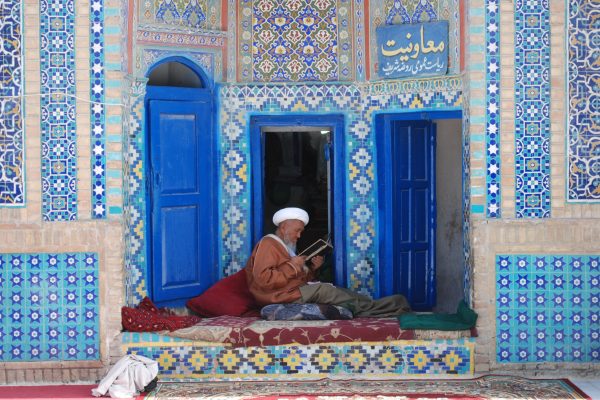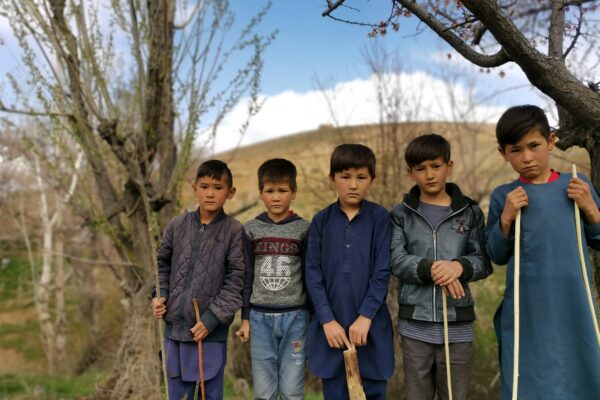“You will see me in another battle, another time, Because God has given hope to my heart. And this hope will bring me back to what I want to reach.”
“You will see me in another battle, another time, Because God has given hope to my heart. And this hope will bring me back to what I want to reach.”
Ustad Khalilullah Khalili, born in 1908 in Kabul province, remains one of Afghanistan’s most beloved 20th century poets, historians, and novelists of the modern era. Considered one of the last of the great Persian poets, his works, although almost entirely unknown to the Western world, are still recited by heart across the Persian speaking world and remains a source of national pride for Afghanistan.
Holy God of absolute power and wisdom, I have this request of Your infinite grace:
Whoever’s been the recipient of Your kindness, May his dignity be life-long. Don’t take it away.
Khalili was orphaned at the age of 11 after the death of his mother and the execution of his father, who was the finance minister for King Habibullah Khan. During the turbulent years when the King’s son Amanullah Khan took over power, Khalili’s father was unfortunately one of many who were executed as the dawn of a new reign of power began in Afghanistan.
One of Khalili’s most famous novels, The Hero of Khorasan, is a controversial and beautifully written novel based off the life of Habibullah Kalakani, who contested for the throne with Amanullah Khan, the man responsible for the death of Khalili’s father. This novel, although based loosely as the biography of Habibullah Kalakani, touched on themes of oppression, love, faith, and hope amidst the horrors of war:
No one knew who would destroy the foundation of tyranny and oppression in this great land. Would it be a scholar who reads and writes under the lights of a candle and smells of smoke every night? Would it be an army general who oppressed his own people with his sword? Or would it be a force that rises from the ashes amongst the oppressed masses of people?
Khalili spent much of his youth in Kabul as an orphan after the death of his parents, and was even thrown in jail at one point before being exiled to Kandahar province as a young adult. It was during his exile to Kandahar, however, where he wrote much of his poetry on love, faith, and the beauty of nature.
Come, come that you and I will go to the field,
Come that you and I will go close to the flowers.
Come that you and I will sit there, And I will bring you beautiful flowers,
Purple, yellow, black, white,
And I will make you a necklace.
Let the rain come gently, slowly,
Over the flowers, over the trees, Over you, over your head, and over your beautiful clothes.
I want only nature, no one else,
I want nature to dominate, joy to dominate, laughter to dominate
Between you and me.
He was eventually allowed to return to Kabul in the 1950s when he was in his mid-40s. Once having returned to Kabul, Khalili spent much of his years as a professor at Kabul University as well as serving as the Minister of Culture and Information. Unfortunately when the Soviets invaded Afghanistan in the late 1970s, Khalili was forced to flee his beloved country and found asylum in Germany and then later in the United States. It was during his years abroad where he wrote his most powerful poems on the darkness of war and the beauty of his native land of Afghanistan.
Oh the cruel, the despot, the oppressor! I will not indeed be giving that to the one who wants to destroy me.
You will see me in another battle, another time, Because God has given hope to my heart,
And this hope will bring me back to what I want to reach.
While Khalili’s novels and historical work are just as loved, it is his poetry that remains at the heart of why so many Afghans and Persian-speakers continue to adore his writings. Writing on everything from the power of faith to the beauty of love, Khalili touched the heart of even the greatest of legends such as Ahmad Shah Massoud, Afghanistan’s national hero of the 1990s who fought against the Soviets as well as the Taliban. Ahmad Shad Massoud, who was a close and personal friend of Khalili’s son Masood Khalili, often recited Khalili’s poetry from heart as he fought against the Taliban invasion in the high mountains of the Panjshir valley.
The heart of the Believer disdains fear of stormy events.
The Believer’s heart knows only one ship captain: God.
Khalili passed away 1987 while still in exile in Pakistan, and it was only until 2016 when his remains were finally returned to his native land of Afghanistan. He remains buried there today, in the Kabul University mausoleum, where he inspired and continues to inspire so many in a land where poetry remains at the heart of soul of everything.
Man does not die by death; Death only steals his name.
As death renders eternal, How can he simply die?





